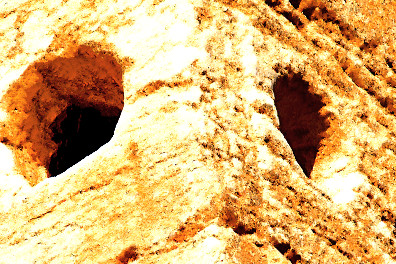The translation in your question does not match the translation in the link provided. It says: "I tied it at the ring where the Prophets tied it before (i.e. Buraq Wall or the Western Wall).", whereas the translation from the link you have provided says:
فَرَكِبْتُهُ حَتَّى أَتَيْتُ بَيْتَ الْمَقْدِسِ فَرَبَطْتُهُ بِالْحَلْقَةِ الَّتِي يَرْبِطُ بِهِ الأَنْبِيَاءُ
I mounted it and came to the Temple (Bait Maqdis in Jerusalem), then tethered it to the ring used by the prophets.
— Sahih Muslim — Hadith 162 a
The Arabic words do not specify what the previous prophets tied to that ring. The use of the word ring here is also inaccurate, as the word could mean holes in the wall, which some claim that the holes in the picture below are the ones used (only a claim, but without proof).

Tethering al-Buraq to the ring used by the prophets indicates the ring being used by more than one prophet, but not necessarily al-Buraq being used by more than one prophet. Having said that, there are some scholars who said that al-Buraq was mounted by prophets other than Prophet Muhammad ﷺ. Said opinions are not confirmed beyond doubt through an authentic hadith, or otherwise.
In Fat'h Al-Bari (Arabic: فتح الباري شرح صحيح البخاري) by Ibn Hajar al-Asqalani (Arabic: أحمد بن علي بن حجر العسقلاني), quoting al-Zubaidi and al-Nawawi:
كان الأنبياء يركبون البراق. قال: وهذا يحتاج إلى نقل صحيح. قلت: قد ذكرت النقل بذلك ويؤيده ظاهر قوله: فربطته بالحلقة التي تربط بها الأنبياء
— NOTE: My own translation, so treat with care:
[Al-Zubaidi] said: "The prophets used to ride al-Buraq." [Al-Nawawi] said: "This requires an authentic source." [Al-Zubaidi] said: "I tied it at the ring where the Prophets tied it before."
— Fat'h Al-Bari » Chapter of Mi'raj
In the paragraph that follows, Ibn Hajar al-Asqalani quotes Ibn Is-haq's hadith of Watheema:
فاستصعبت البراق، وكانت الأنبياء تركبها قبلي وكانت بعيدة العهد بركوبهم
— NOTE: My own translation, so treat with care:
I found mounting al-Buraq was difficult, and the prophets used to ride it before me, but this was a long time ago.
This hadith could not be authenticated, either. There are other hadiths to the same effect. However, al-Asqalani pointed out that the multiplicity of hadiths about the topic do not strengther any of the them beyond what was documented in Sahih Muslim — Hadith 162 a. An example — among severl others — of a hadith to the same effect is:
عَنْ أَنَسٍ، أَنَّ النَّبِيَّ صلى الله عليه وسلم أُتِيَ بِالْبُرَاقِ لَيْلَةَ أُسْرِيَ بِهِ مُلْجَمًا مُسْرَجًا فَاسْتَصْعَبَ عَلَيْهِ فَقَالَ لَهُ جِبْرِيلُ أَبِمُحَمَّدٍ تَفْعَلُ هَذَا فَمَا رَكِبَكَ أَحَدٌ أَكْرَمُ عَلَى اللَّهِ مِنْهُ قَالَ " فَارْفَضَّ عَرَقًا " . قَالَ أَبُو عِيسَى هَذَا حَدِيثٌ حَسَنٌ غَرِيبٌ وَلاَ نَعْرِفُهُ إِلاَّ مِنْ حَدِيثِ عَبْدِ الرَّزَّاقِ
Narrated Anas: that Al-Buraq was brought to the Prophet (ﷺ) on the Night of Isra, saddled and reined, but he shied from him. So Jibra'il said to him: "is it from Muhammad that you do this? By your Lord! There is no one more honorable to your Lord than him." He said: "Then he started sweating profusely."
— Jami' at-Tirmidhi, Vol. 5, Book 44, Hadith 3131
As you can see from the reference, this hadith, too, is weak.
The conclusion is there is no authentic verse from the Qur'an or hadith that inform us about al-Buraq being used by any other prophets. There are scholarly opinions that this may have been the case, but without confirmation from any of them.

